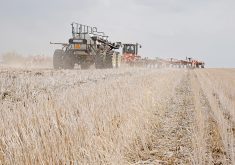It’s unfortunate, but marriages do fail.
That alone can be cause for sadness, but when a marriage also involves one or both of the partners owning a farming business, it is vital to consider the value of the business and how it can be protected.
Failed marriages among adult children involved in a family farm can have serious implications to the farm assets.
We rarely want to think about the implications of a failed marriage when we get married or start our business with our spouse.
Read Also

New coal mine proposal met with old concerns
A smaller version of the previously rejected Grassy Mountain coal mine project in Crowsnest Pass is back on the table, and the Livingstone Landowners Group continues to voice concerns about the environmental risks.
However, a business relationship with a spouse is the same as with any other individual and should be approached as such.
That means creating a shareholder or partnership agreement, which can make the separation of a business after a divorce less complicated.
Couples often neglect this type of agreement because one spouse is involved only for tax planning purposes. However, it can force them to find ways to establish the value of the business so that one can buy out the other.
The Family Law Act has a system that is intended to equalize the increase in the family’s net property (total assets less total debt) between the marriage date and the separation date.
However, the act doesn’t insist that one party buy out the other party’s business interest, which could result in both of them keeping their ownership in the farm.
In a situation where one party owns 80 percent and the other 20 percent, the act will require that the 80 percent shareholder make an equalization payment equal to 30 percent of the value of the business to the 20 percent owner.
This can be problematic because high land values do not necessarily mean cash availability. As a result, equalization payments can be crippling.
It is best for both parties to no longer have the non-farming spouse involved once the separation has taken place.
This is where having an ownership agreement can be beneficial.
The agreement can make it possible for the spouse involved with the business to buy out the other party’s ownership interest.
The spouse not involved will receive cash or other assets that they can use to buy a home or another investment.
It is often necessary in this process to hire professionals who specialize in valuing assets.
A business valuator can determine the fair value of the business and determine an equalization payment from one to the other if necessary. Appraisers can also become heavily involved in determining values of land and equipment.
A simple example of an equalization payment would be when the wife’s assets since the date of marriage have increased in value by $1 million, and the husband’s have increased by $600,000. A basic equalization payment would be half of the difference in fair value of the assets, which would involve the wife paying the husband $200,000.
Complex tax implications are another consideration when separating assets.
Certain transactions can occur without tax consequences only before parties are divorced. As a result, it will be important to discuss the timing of asset separation with a tax adviser.
It is important to remember that many emotions can be involved during a separation, but it is in the best interest of both parties to deal with business issues on a rational basis.
This will minimize complications during the separation and allow both parties to move on while maximizing value.
Colin Miller is a chartered accountant and senior manager in KPMG’s tax practice in Lethbridge. Contact: colinmiller@kpmg.ca. He would like to thank Ryan Stevenson and Ebony Verbonac of KPMG for their assistance with writing this article.
















